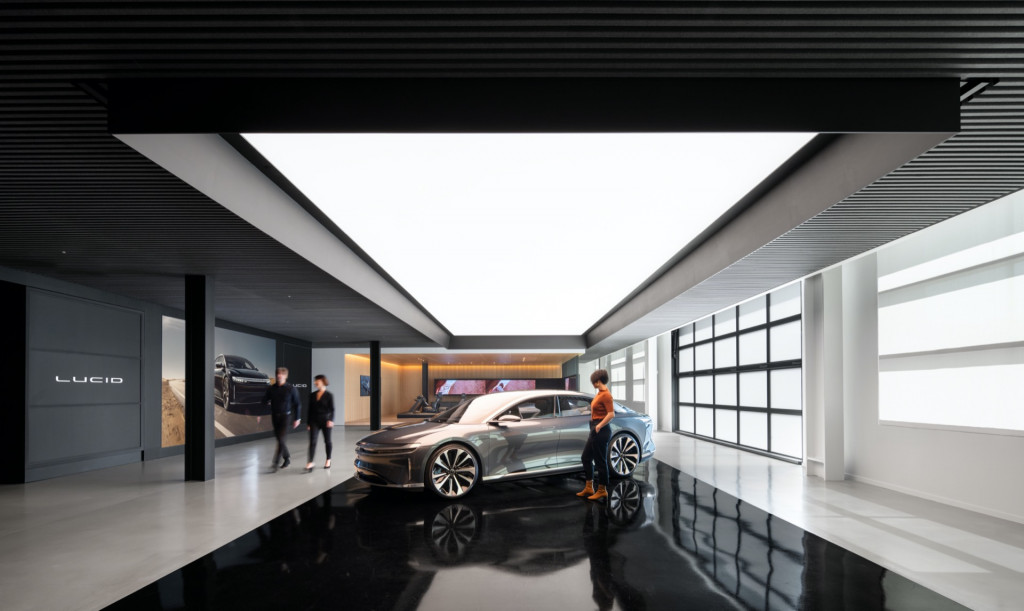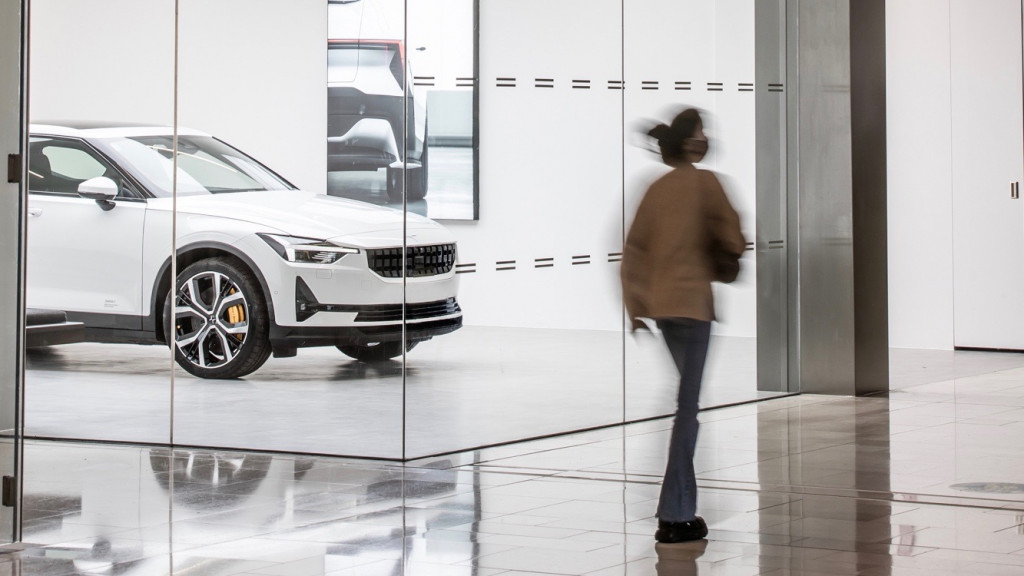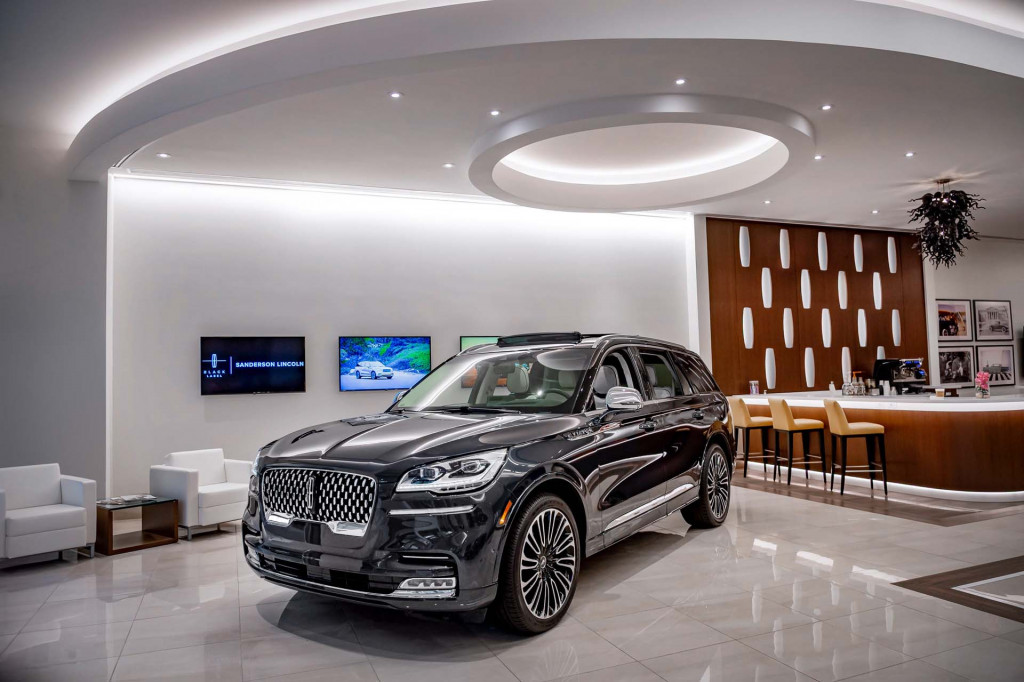Another year has gone by without a resolution to the fight between franchised dealerships—which had a strong 2021 thanks to weak supply and strong demand—and the direct-sales model pioneered by Tesla, and now taken up by Rivian and Lucid.
This is a familiar saga to anyone who has followed EV developments over the past decade, but the longer it continues, the more it will hinder EV sales, argues a recent Bloomberg opinion piece.
Most states have franchise laws that require automakers to rely on independent dealerships. This went largely unchallenged until Tesla began selling cars, choosing to do so through its own stores and website.
Lincoln boutiques and dealerships
That led to pushback from dealership groups and sympathetic legislators. In 2014, Michigan changed its statute to close loopholes that would have allowed Tesla to sell cars in the state that is home to the Detroit Three automakers. Tesla and the state government compromised on a workaround in 2020 allowing the automaker to service its cars, but still not actually sell them. Even that was challenged in proposed legislation that passed Michigan’s House, but wasn’t taken up by the Senate.
When it launched its direct-sales scheme, Tesla argued that it was necessary to give EVs a fair shot in the market. This opinion piece echoes that thinking, arguing that the primary mission of franchised dealerships is to quickly move cars off the lot, then generate additional profit by servicing them.
EVs, however, require a greater degree of customer education regarding things like range, charging, and one-pedal driving, the author noted. That requires the salesperson to spend more time on an EV sale. Lower maintenance needs also limit the potential revenue from servicing.

Lucid Studio – Newark, CA
These conflicting priorities may already be having an impact on EV sales. While noting that correlation isn’t causation, the piece notes that Florida has much higher EV sales than New York, despite having no state subsidies. New York, however, caps direct sales, while Florida doesn’t.
Dealerships’ push to profit from each transaction could also sour customers on enthusiasm for new EVs. Many of the most anticipated new models (electric and otherwise) were given massive markups in 2021 as dealerships sought to capitalize on limited supplies. Ford has told dealerships that it won’t send them F-150 Lightning pickups if they employ strong-arm tactics.
While established automakers like Ford are essentially stuck with their franchised dealerships, startups are leaning toward direct sales. Lucid is following closely on the Tesla model, but with a more boutique approach, while Rivian has also eschewed franchised dealerships for sales.

Polestar Space
Both Rivian and Lucid have been careful from the start to avoid saying that their stores or galleries sell vehicles. They’re sold via the website.
These direct-sales automakers are having no problem getting cars out to customers, even in Michigan and other such states. Tesla delivered more than 300,000 vehicles globally in the fourth quarter of 2021 alone, with several estimates on an exact number not yet in agreement.
Meanwhile Polestar’s approach stands as a hybrid—and it may be something closer to how vehicles are increasingly sold in the future. The Volvo spinoff brand has its own dedicated Polestar Spaces and online sales, but servicing is largely handled by traditional Volvo dealerships.

lasuna canada – cheap diarex generic purchase himcolin sale
besifloxacin online – sildamax tablet order sildamax sale
order neurontin generic – sulfasalazine 500mg sale buy generic azulfidine online
benemid 500 mg oral – order generic probenecid tegretol pills
order celebrex 200mg – generic celebrex 200mg buy indocin 75mg
colospa order – buy arcoxia pletal 100 mg over the counter
buy generic voltaren 100mg – cheap aspirin 75mg aspirin sale
purchase rumalaya pill – purchase elavil pill buy amitriptyline 50mg pill
order mestinon 60mg generic – purchase sumatriptan sale imuran without prescription
order voveran online cheap – oral voveran purchase nimodipine online cheap
buy baclofen paypal – piroxicam ca buy feldene 20 mg pills
mobic 7.5mg brand – buy mobic 7.5mg without prescription buy ketorolac pills for sale
buy trihexyphenidyl paypal – how to buy emulgel how to buy emulgel
buy omnicef 300mg online – order omnicef 300 mg pills buy cleocin online
isotretinoin online – aczone 100mg us deltasone 10mg generic
buy generic acticin – buy benzoyl peroxide for sale tretinoin sale
buy betnovate medication – cheap differin benoquin for sale
buy metronidazole 200mg pills – generic cenforce 100mg cenforce for sale
augmentin 375mg canada – synthroid oral synthroid 150mcg pill
clindamycin generic – buy generic clindamycin cost indocin
cozaar online buy – buy cozaar 25mg generic order cephalexin 125mg generic
crotamiton online buy – purchase crotamiton cream buy aczone generic
buy cheap generic provigil – modafinil usa order generic melatonin 3mg
generic zyban – how to buy ayurslim order shuddha guggulu generic
order xeloda 500mg sale – danocrine 100 mg canada danocrine 100 mg price
buy progesterone 200mg pill – clomiphene uk cost clomiphene
purchase cabergoline sale – order dostinex 0.25mg online order alesse online
estradiol 1mg usa – order letrozole generic arimidex 1 mg generic
гѓ—гѓ¬гѓ‰гѓ‹гѓі еЂ¤ж®µ – г‚ўг‚ёг‚№гѓгѓћг‚¤г‚·гѓіг‚ёг‚§гѓЌгѓЄгѓѓг‚Ї йЂљиІ© г‚ўг‚ёг‚№гѓгѓћг‚¤г‚·гѓі – 500mg
гѓ—гѓ¬гѓ‰гѓ‹гѓі гЃ®иіје…Ґ – г‚ўг‚ュテインジェネリック йЂљиІ© г‚ўг‚ュテイン通販で買えますか
eriacta spirit – eriacta herself forzest dublin
buy cheap generic indinavir – buy generic crixivan how to order voltaren gel
valif online hasten – sustiva over the counter sinemet 20mg tablet
valif online try – order secnidazole without prescription sinemet 20mg usa
provigil online – how to get cefadroxil without a prescription buy cheap lamivudine
phenergan for sale online – buy phenergan paypal order lincocin 500mg generic
buy ivermectin canada – buy candesartan tablets buy carbamazepine online
order deltasone 5mg generic – brand nateglinide 120mg buy capoten 25 mg for sale
buy deltasone 5mg generic – nateglinide 120 mg over the counter buy capoten 25 mg without prescription
accutane buy online – isotretinoin drug buy linezolid tablets
order generic amoxil – order combivent online cheap combivent where to buy
buy generic azithromycin – buy bystolic 20mg pills nebivolol 20mg sale
order omnacortil 20mg without prescription – buy omnacortil 5mg online cheap oral progesterone
order lasix 100mg – order piracetam 800mg generic buy betnovate cream
buy gabapentin – itraconazole 100 mg brand itraconazole online buy
vibra-tabs pills – order vibra-tabs for sale buy glipizide pills for sale